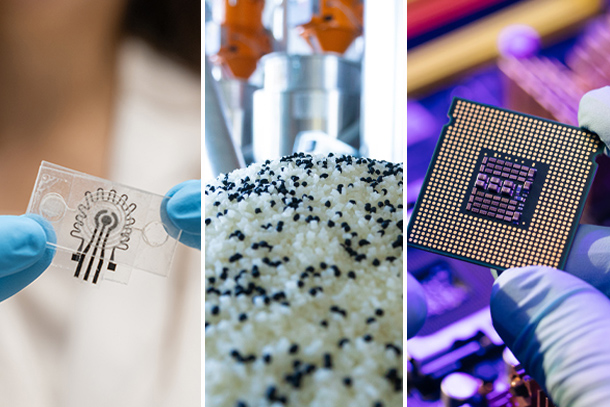
Students in the engineering science undergraduate major now have the opportunity to select from eight discipline options when completing their bachelor’s degree in engineering science. Credit: Kate Myers/istockphoto
Engineering science major pilots new undergraduate concentrations
April 18, 2024
By Mariah R. Lucas
UNIVERSITY PARK, Pa. — Students in the engineering science undergraduate major now have the opportunity to select from eight discipline options when completing their bachelor’s degree in engineering science, from neural engineering or acoustics to experimental mechanics and materials.
“These options provide students with the opportunity to explore particular engineering fields in more depth and pave the way for their future success as innovative engineers,” said Vincent Meunier, head of the Department of Engineering Science and Mechanics (ESM). “Additionally, these pathways simplify the process of finding academic and research advisers aligned with students’ professional ambitions, allowing them to customize their educational journey. Beyond the existing options, students also have the freedom to create a personalized pathway with the support of our committed advisers, ensuring their education meets their specific career goals.”
Each of the eight discipline options — as well as the self-designed study option — requires 24 credits of foundational and technical elective coursework, plus six credits of capstone project or thesis work, for a total of 30 credits of concentration. Previously, the major included coursework that touched on each topic but did not allow students to declare a concentration. The change also allows students to better showcase their skills for their future career endeavors.
Students declare their option during their second year of study. The department will continuously assess the popularity and relevance of each option and determine if any of the academic plans or required courses need to be adjusted.
In addition to the discipline concentrations, engineering science also offers an opportunity to graduate from its in-house honors program. To enter the major, students must have a 3.0 GPA and are then automatically enrolled in the honors program. To graduate with honors from the program, students must maintain a GPA of 3.33, take honors classes and write an honors thesis, in consultation with a faculty adviser. More than half of each engineering science class typically graduates with honors.
For his undergraduate thesis, graduating senior Jon Whitby designed a thermal imaging system to monitor directed energy deposition, a type of metal additive manufacturing. Whitby’s academic track most closely aligns with the new theoretical and computational mechanics option, which provides students with the foundational knowledge of physics-based and data-driven models for a range of natural and engineered systems. Ted Reutzel, associate professor of ESM and director of the Center for Innovative Materials Processing Through Direct Digital Deposition (CIMP-3D) lab, served as Whitby’s faculty adviser.
“I think the new undergraduate options will be invaluable for providing clarity and identity to this major, both for prospective students comparing majors and for current students marketing themselves to employers,” Whitby said.
Whitby will attend Purdue University in the fall to pursue a doctorate in mechanical engineering with a concentration in solid mechanics, with the hope of remaining in academia and pursuing a faculty position. He said he enjoyed the major’s focus on physics, mathematics and theory. He also appreciated the small class sizes, high faculty-to-student ratios and close-knit community of an honors program.
“Engineering science also stood out to me because of the opportunity to complete lab research and write an honors thesis,” Whitby said. “Writing a thesis was a great first exposure to research and technical writing, which will help me in graduate school.”
Fourth-year engineering science major Sydney Assalita’s senior thesis, titled “Quantitative Ultrasonic Characterization of Ti-6Al-4V Components with Surface Roughness,” was completed under faculty adviser Andrea Argüelles, assistant professor of ESM and the department’s associate head for diversity and inclusion. Her work, which most closely aligns with the signals, systems, and sensing option, analyzed how surface roughness impacts ultrasonic techniques that evaluate materials. The option teaches students about sensing and system monitoring, which has numerous applications ranging from wearable sensors for human health monitoring to industrial parts, machinery and systems.
“I liked how engineering science was extremely flexible and customizable to my interests,” Assalita said. “I was able to take courses across multiple departments as I grew and developed my specific interests over time.”
Assalita participated concurrently in the Schreyer Honors program. In the fall, Assalita plans to attend the University of Michigan to pursue a doctorate in electrical engineering and computer science, with a research focus of signal and image processing and machine learning.
“The engineering science program allowed me to be a competitive candidate in the application process,” Assalita said. “It was appealing to schools that I had depth and breadth of knowledge, as well as a large emphasis on theory in my undergraduate education. Completing a thesis allowed me to showcase past success on research projects, which many graduate schools look for.”



